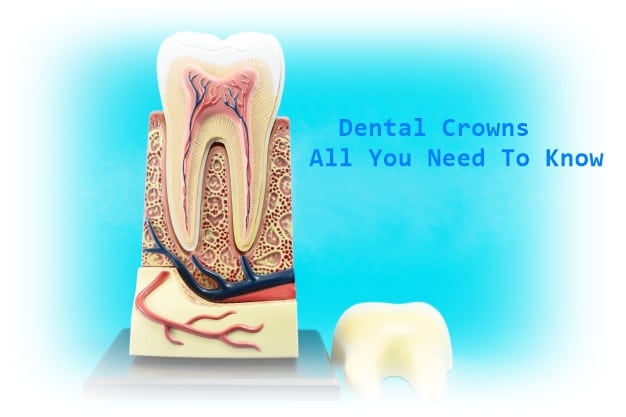Dental crowns are usually used for restorative methods that can be opted for when you (in case you are the patient) have some portion, or rather a small portion, of your damaged teeth left. The situation turns out to be such that if the tooth is removed, there won’t be much tooth structure left for you to go for a filling!
A crown is simply made of porcelain fused to metal. Porcelain actually takes the shape of a tooth and makes up the front part of the crown. This is indeed a visible part of your crown. The metal support is fitted from behind, rather, fused to the backside of the crown. the metal could be anything – gold, base metal or other alloys. However, because porcelain is not as bite resistant as the metals, it may chip over time, thus exposing the metals. Hence, porcelain fusion is not recommended for molars (back teeth), which stand the maximum biting pressures!
So when would you go for a dental crown?
- To correct a damaged or cracked tooth
- To cover a chipped tooth, if most of the tooth portion is missing,
- To cover a dental implant
- To hold together a tooth if there has been a root canal
- To hold a dental bridge in place
Another issue where crowns prove to be a better choice is where the edge of the tooth has been damaged by grinding. Therefore, people in the habit of grinding their teeth (bruxism) or clenching are usually recommended crowns.
To cut a long story short, crowns are mainly resorted to, when there are more serious issues concerning the existing teeth. These instances include:
- Teeth that are badly broken or cracked
- A tooth where root canal treatment has been conducted
The crown is used to keep the restored tooth and, in fact, protect it from any further damage, because that might culminate in its extraction! Once the crown is put firmly into place, it turns into the new outside surface for the tooth, with the nub of the original tooth lying safely inside.
Dental crowns are required to be subjected to a good amount of care. The porcelain used for crowns is quite stain-resistant, but in the absence of proper brushing and flossing, it can also discolor. Whitening and bleaching treatments do not work on this particular kind of restoration work. So, it’s very important to maintain oral hygiene and good eating habits. Again, be careful of biting on hard substances or else it could lessen the lifespan of your beautiful smile!
Now the question that bothers us the most is How Long?
As it commonly applies, how long your crown would last, normally depends upon what oral health care regime you are following to maintain your dental health. The total lifespan of a dental crown can range anywhere from 5 years to 30 years. In fact, in some cases, crowns have proven to last for a lifetime! As earlier discussed, one should not only be careful about hygiene but also his or her biting pressures!
Avoid ill habits like:
- Biting your fingernails
- Chewing the back of your pen or pencil while sitting in the study or your work table
- Opening plastic packets with your teeth and so on
So how are you planning to take care of your crowns? You may stick to these golden rules, if you want to add more years to the lifespan of your crowns…
- Be careful while brushing your teeth. If you have crowns done to your teeth, be cautious when you are moving your brush through the junction where your gum line meets the crown
- If you are in the habit of clenching or grinding your teeth, try wearing bite guards
- Avoid biting hard objects like an unripe guava, nuts and the like.
What if your crowns get damaged?
On average, a crown lasts more than a decade. However, in case your crown fails, reasons like a tough bite, discoloration of the original crown or decay of the original tooth beyond the edge of the crown might call for a replacement of the crown. A replacement crown is prepared as simply as your first one. Before everything else, your old crown needs to be removed, which involves cutting it out. Therefore, restoring the old crown is nearly impossible. Once it is cut out, an impression of the existing amount of tooth is taken, and the same procedure (as that of making a new crown) is followed.
It is therefore well understood that no amount of restorative methods, like teeth whitening or bleaching, will work on these dental corrections! The more careless you are about them, the earlier you lose them!
Be it your first tooth restorative procedure, be it a replacement or be it simply an advice that you are seeking on whether to go for dental crowns, you can step in to Floss Dental at Sugar Land to wipe out the worries and answer your queries.
